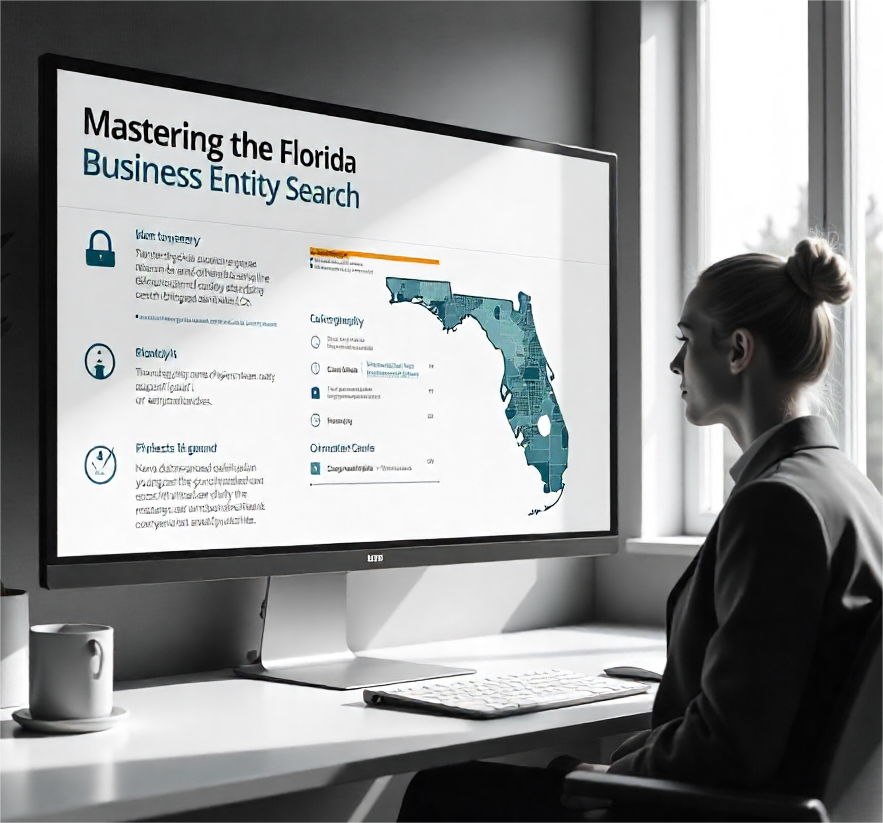Florida Business Entity Search is a powerful online tool for finding information about registered companies in Florida. It allows users to verify business names, check registration details, and confirm legal status. This search is essential for entrepreneurs, investors, and individuals ensuring a business’s legitimacy. With accurate, state-maintained records, it streamlines due diligence and decision-making.
The Florida Division of Corporations offers an online service called Florida Business Entity Search that lets you look for detailed information about firms that are registered in the state. This search helps you find records like firm names, registration dates, owners, and current standing. You can use it to examine a company’s authenticity, status, or do research. It’s a must-have for business owners, investors, and anybody who wants to make smart business decisions in Florida.
Background Study on the Florida Business Entity Search
The Florida commercial Entity Search is very important for making commercial operations in the state more open and trustworthy. It lets people and businesses do full background checks on registered entities to make sure they are following the law. This application helps reduce fraud and makes it easier to follow state rules by making official records easier to get to. It also makes it easier to find existing business names, stop duplicate registrations, and keep Florida’s companies unique. For business owners, it’s an important part of the planning process. For investors and scholars, it gives them a lot of information about the histories and current states of companies. The program gives users the power to make smart decisions quickly thanks to its simple-to-use design.
Understanding Florida Business Entities
Florida law recognizes several different sorts of businesses, each with its own set of rules, criteria, and ways of doing business. For accurate search results and correct interpretation of information, it is important to know these differences.
Limited Liability Companies (LLCs)
Limited Liability Because they are flexible and safeguard against liability, companies are the most common type of business in Florida. LLCs shield firms from being sued and treat them like partnerships for tax purposes. This makes them appealing to small and medium-sized businesses. These businesses need to file Articles of Organization with the state and have a registered agent in Florida.
Corporations
There are two main types of Florida businesses: C-Corporations and S-Corporations. C-Corporations have to pay taxes twice, but they can grow and invest as much as they want. S-Corporations keep the benefits of being a corporation while also offering pass-through taxation benefits. Both types need to file Articles of Incorporation and follow state rules at all times.
Partnerships
General Partnerships, Limited Partnerships, and Limited Liability Partnerships are all types of partnership entities. In a general partnership, everyone is in charge and there is no limit on personal culpability. In a limited partnership, there are both general partners who are in charge of managing the business and limited partners who are only investors. Limited Liability Partnerships safeguard professional service businesses like law firms and accounting firms from being sued.
Sole Proprietorships
Sole proprietorships are the easiest type of business to set up, but they don’t insulate you from liability or keep your personal and corporate assets separate. If an entity is doing business under a name that is not the owner’s legal name, it can register a fake name with the county clerk.
Where to Conduct a Florida Business Entity Search
Official State Database
The Florida Department of State, Division of Corporations is in charge of the major official database for company entity searches. This free resource, which can be found on the department’s website, has the most accurate and up-to-date information regarding registered businesses in Florida.
Alternative Search Resources
Many third-party platforms offer better search options and tools for gathering more data. These services generally combine information from many sources to make business profiles that are more complete. However, before making crucial business decisions, consumers should check important facts with official governmental records.
Commercial database services might have powerful search filters, the ability to track historical data, and services that let you know when an entity’s status changes. Even though these services cost money, they usually have easier-to-use interfaces and more analytical features.
Key Features of Florida Business Entity Search
The Florida Business Entity Search has a number of important features that help people quickly find and confirm business information. Some of the most important features are:
- Entity Name Search
People can look for a business by its full name or a part of its name to get more information about its registration, status, and other data.
- Document Searches
The service provides access to key documents such as Articles of Incorporation, annual reports, and amendments, allowing users to review critical filings.
- Inactive and Active Status Identification
The search tool lets users find out if a business is still open, closed, or no longer exists, which helps them figure out its operational condition.
- Registered Agent Information
Florida law says that each listed entity must provide information about the registered agent, such as their name and contact information.
- Filing History
Users can look at a complete filing history for each entity, which helps them see how the business structure or compliance has changed over time.
- Free Access
The Florida Business Entity Search is different from many other commercial database services since it lets everyone see all publicly available data for free. This makes it a great resource for both businesses and individuals.
These features make it easy and clear to check important company information and help with decision-making that follows state rules.
Step-by-Step Guide to Performing a Search
Accessing the Official Database
Go to the Florida Department of State’s Division of Corporations site. There is a big “Search Records” section on the homepage that lets you search the corporate entity database. To go to the main search page, click on the “Corporation Search” link.
Basic Search Process
The search interface has a number of ways to search so that it can work with diverse situations where information is available. The “Entity Name” search option works best if you know the full or part of the business name.
To find partial names, use “Contains” instead of “Starts With.” This will make sure you receive all the numerous ways that business names can be spelled. The system looks for names that are registered, false, or somehow connected to each organization.
Advanced Search Options
When you have the state-assigned identification number, the “Document Number” search option takes you directly to the records of a certain entity. This method gives the most accurate results and is especially useful for doing more investigation on entities that have already been recognized.
You may look up entities that have the same registered agents by using the “Registered Agent Name” search. This method is useful for finding business connections, corporate families, or networks of service providers.
Filtering and Refining Results
Results of a search show up in a list with basic information about each item, such as its name, document number, status, and type. To see more information on each business, click on the names of the individual entities.
You can use the status filter options to look for current entities, dissolved corporations, or certain categories of entities. These filters help you limit down big sets of results and focus your research on firms that are relevant.
Information Available Through a Business Entity Search
Basic Entity Details
The official registered name, document number, entity type, and current status are all included in each business entity record. The state gives each document a unique number, which stays the same for the whole time the entity is in business.
The entity status shows if the business is still in good standing, has been dissolved by the government, or has other compliance problems. Knowing the terms for status helps you figure out if an entity is real and able to do business.
Registered Agent Information
The information about the registered agent includes their name, physical address, and often their phone number. This information helps confirm that the entity is accessible and gives us a better idea of how the business works.
Instead of naming company executives, many businesses hire professional registered agents. Finding these service providers can help you find other business connections and professional networks.
Principal Address and Officers
The major office address shows where the business is based, which may not be the same as the registered agent address. This information gives us a better idea of where real businesses are located and helps us check the legitimacy of an entity.
The information on officers and directors is different for each type of business. Corporations have to give the names and addresses of their officers, whereas LLCs can give the names and addresses of their managers or members. This information helps find important people who make decisions and commercial connections.
Filing History and Compliance Records
The database keeps track of all the filings made by each organization, such as incorporation papers, annual reports, and amendment filings. This filing history gives us important information about how businesses develop over time, who owns them, and how they follow the rules.
Patterns in filing annual reports show that the company is still following state rules. Entities who file on time and consistently show that they are stable and committed to following the law.
Why Conduct a Florida Business Entity Search?
Due Diligence Applications
Checking the validity and compliance status of an entity before doing business with them, making a purchase, or giving them credit safeguards against fraud and operational risks.This proves that the company is legally real and in good standing.
Before getting into a possible relationship with “Citrus Grove Ventures,” it is important to look into the company to make sure it is still in good standing and has the right legal status to fulfill its contractual responsibilities.
Competitive Analysis Benefits
commercial entity searches give you useful information about your competitors, such as their market players, company structures, and commercial relationships. When you search for “Sunshine LLC client login” you may find out about possible competitors, where they fit in the market, and what they do in certain industries.
Knowing how competitors establish their businesses, file their taxes, and do business with each other can help you figure out how to position yourself in the market and come up with a competitive strategy.
Legal Compliance Verification
Regulatory compliance requirements typically demand businesses to check their registration and status. Before doing business with someone, professional service providers, government contractors, and regulated sectors must check that the entity is real and following the rules.
When you search for “Ocean View Properties Inc.,” you can see who the company’s officers and directors are. This makes sure that the right people are in charge of signing contracts and other legal documents.
Business Name Protection
Before starting a new firm, entrepreneurs must check to see if the name is available and look for any possible trademark issues. Comprehensive entity searches show firms with names that are similar to yours, which can help you avoid legal problems and problems with registration.
The search process also finds dissolved corporations with names that are attractive and may be available for new businesses to start if the right amount of time has passed.
Common Mistakes to Avoid
Incomplete Search Methodology
A lot of researchers only use one search phrase or an exact name match, which means they can miss entities that are related yet have similar names, different spellings, or made-up names. A full search should include searches for different name combinations, partial matches, and keywords that are linked to the name.
If you don’t check more than one type of company or status category, you can miss businesses who are operating under different legal forms or are having temporary compliance problems.
Misinterpreting Status Information
To really comprehend how a firm can operate, you need to carefully interpret the terms used to describe its entity status. “Active” status means that the business meets the minimum requirements set by the state, but it doesn’t mean that it is financially stable or able to operate.
Even though they are no longer functioning, dissolved entities may still have some legal responsibilities and debts. Recognizing these differences is essential for precise risk evaluation and adherence to legal requirements.
Overlooking Filing History Patterns
The current state of a corporation doesn’t give us much information about how stable the business is or how committed it is to following the rules. Historical filing patterns provide us a better idea of how businesses run, how management changes, and how committed they are to following the rules.
If there are gaps in annual report submissions, frequent address changes, or repeated compliance violations, it could mean that the company is not stable or that there are management problems that aren’t clear from the current state.
Advanced Search Techniques
Utilizing Keyword Strategies
To find organizations with names that are similar or that do business in comparable fields, you often need to use inventive keyword strategies. Use terms that are specific to your field, geographical markers, and typical business name patterns to find the right entities.
Wildcard characters and incomplete name searches help find name variations, misspellings, and related businesses that exact match searches might not find.
Cross-Referencing Multiple Data Sources
When you combine official state documents with additional public databases, you get more complete business knowledge. Property records, professional license databases, and court records can help businesses confirm information and learn more about how they work.
Social media profiles, company directories, and news articles give up-to-date information about what businesses are doing and where they stand in the market that formal entity records don’t.
Time-Based Search Analysis
Historical search research shows how businesses are formed, how industries evolve, and how the competitive landscape changes. Keeping track of when companies are formed, when they go out of business, and when ownership changes hands gives you useful market information.
Keeping an eye on certain businesses over time might help you spot chances to grow your business, change how it works, or form a partnership or buy another business.
Legal and Compliance Considerations
Information Accuracy and Limitations
Official entity documents show what businesses have told the state government. This information is usually accurate, but it might not show changes in operations that happen in real time, unofficial commercial partnerships, or ownership arrangements that aren’t made public.
Privacy and Confidentiality Issues
Business entity records are public information, but researchers must respect privacy and use the information correctly.
Some types of entities provide more privacy protections or fewer disclosure restrictions, which may make it harder to find information through public searches.
Professional Consultation Requirements
Professional legal or accounting help is often needed for complicated company deals, legal fights, and problems with following the rules that go beyond basic entity search features. Search results are not final legal judgments; they are only the beginning of professional analysis.
Florida Business Entity Search Using Techsharpeds.com
Techsharpeds.org makes it easy and quick to find information on businesses in Florida. Our expert recommendations and step-by-step guidelines make it easy to check statuses, verify firms, and comprehend search results. We make the process quick, accurate, and easy to use, whether you’re doing research for work or for fun.
Start Your Florida Business Research Today
Learning how to search for Florida company entities gives you the tools you need to make smart business decisions and do thorough professional due diligence. This in-depth guide gives you the skills and knowledge you need to do business research, competitive analysis, and make sure you’re following the law.
The Florida Department of State’s official database gives free access to a lot of information about businesses, which makes it possible for students, entrepreneurs, and business professionals to do professional-quality research. Regularly practicing search tactics and how to read results helps you become an expert at acquiring business intelligence.
Go to the official website of the Florida Department of State to start your search for a business entity in Florida. This article shows you all the steps you need to take to make sure you do your due research and make an informed decision. If you have a complicated business issue in Florida, get in touch with lawyers who can help you understand the state’s business laws and compliance needs.
Share this tutorial with coworkers and business partners to help them make better business decisions and improve the aggregate due diligence skills of everyone in your professional network.
FAQs for Florida Business Entity Search
What is a Florida Business Entity Search?
People can do a Florida Business Entity Search to learn about businesses that are registered in the state. People generally use this tool to examine if a business is real, what its status is, and other crucial information.
Where can I perform a Florida Business Entity Search?
The Florida Department of State’s Division of Corporations website lets you do a Florida Business Entity Search. Anyone can use the search feature for free.
What information do I need to conduct a search?
You usually need the name of the business, its registration number, or the name of a person who works for the business to do a business entity search. Getting the right information makes it easier to find what you’re looking for.
What details are available through the search?
The search gives you useful information. It has the name of the business, the date it was registered, and its status (active or inactive). It also reveals the principal address, the name of the registered agent, and the history of filings.
Can I search for trademarks and trade names through the database?
The Florida Department of State’s database does have information on trade names and trademarks that are linked to registered firms. You can use the same search tools on the website to find these.
Are there any costs associated with using the search tool?
No, the Florida Business Entity Search is free for everyone to use. But there may be expenses for ordering some documents, such certified copies or a certificate of status.
How frequently is the business entity database updated?
The Florida Department of State keeps its corporate entity database up to date so that the information is as accurate as possible.
Who can I contact for further assistance?
You can also get more help by calling or emailing the Florida Department of State’s Division of Corporations directly. You may find their contact details on their official website.




